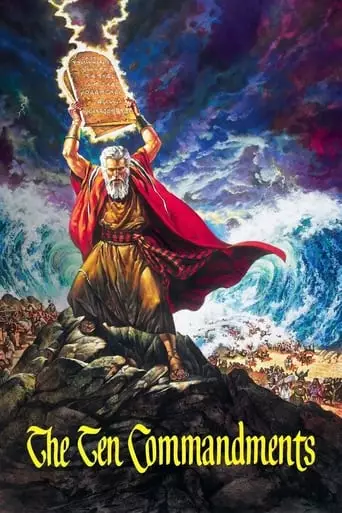
The Ten Commandments (1956) Watch Online Free
Escaping death, a Hebrew infant is raised in a royal household to become a prince. Upon discovery of his true heritage, Moses embarks on a personal quest to reclaim his destiny as the leader and liberator of the Hebrew people.
Directed by Cecil B. DeMille, The Ten Commandments (1956) is a monumental epic that retells the biblical story of Moses. The film dramatizes Moses’ journey from being an adopted Egyptian prince to becoming the liberator of the enslaved Hebrews, culminating in the Exodus and the receiving of the Ten Commandments on Mount Sinai. Charlton Heston stars as Moses, while Yul Brynner plays the Egyptian Pharaoh Rameses, with Anne Baxter portraying Nefretiri, the conflicted love interest. The story is adapted from the Book of Exodus, incorporating both historical and fictional elements.
Analysis
DeMille’s film is not only a biblical tale but also a reflection on leadership, faith, and freedom. It portrays Moses’ transformation from an Egyptian royal to a prophet driven by divine purpose. The tension between Moses and Pharaoh Rameses serves as the emotional core of the film, showcasing themes of duty, pride, and the conflict between personal ambition and divine will. The portrayal of Moses’ internal conflict as he grapples with his Hebrew heritage and his position in Egyptian society forms the crux of the film’s moral message.
The special effects, such as the parting of the Red Sea, remain some of the most iconic scenes in cinema history. DeMille uses these grand spectacles not only to dazzle audiences but to underscore the power of divine intervention in human affairs.
Spiritual and Religious Themes
The Ten Commandments explores several key themes including faith, redemption, and divine justice. Moses’ journey symbolizes the struggle between personal identity and divine calling, while the relationship between Moses and Pharaoh explores the moral implications of tyranny versus freedom. The plagues, the Exodus, and the dramatic moments leading to the receiving of the Ten Commandments all highlight the theme of God’s will being carried out through human agency.
The film’s impact is profound, particularly in its ability to combine spectacle with moral storytelling. It emphasizes the eternal battle between good and evil, with Moses representing righteousness and Rameses embodying pride and tyranny. The themes of freedom from oppression and the importance of moral laws have continued resonance with audiences throughout the decades.
Cultural and Social Impact
The film is a cornerstone of American cinema, blending historical epic filmmaking with spiritual themes. It has influenced not only the genre of biblical epics but also broader cinematic storytelling, especially in the use of large-scale sets and special effects.
After watching The Ten Commandments, viewers are likely to feel a profound sense of awe and reflection. The film’s grand scale, combined with its exploration of deep themes such as faith, duty, and justice, leaves a lasting impression. It offers an emotional rollercoaster, from the tension of Moses’ internal struggles to the exhilarating moments of divine intervention. You might find yourself contemplating the idea of leadership, sacrifice, and the moral foundations that guide human actions.
Additionally, the film’s dramatic conclusion, with the receipt of the Ten Commandments, provides a sense of closure and spiritual upliftment. It’s a cinematic experience that goes beyond mere entertainment, leaving you with both a sense of admiration for Moses’ courage and a deepened respect for the themes of freedom and divine purpose.
